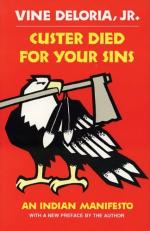
|
| Name: _________________________ | Period: ___________________ |
This quiz consists of 5 multiple choice and 5 short answer questions through Part 4.
Multiple Choice Questions
1. Who was Arthur Watkins?
(a) President Truman's Chief of Staff.
(b) The chairman appointed to run the Bureau of Indian Affairs.
(c) A Mormon named as head the Indian subcommittees in the Senate and House.
(d) A poet who wrote about the Indian problems.
2. What "first" did the Treaty of August 5, 1826 enact?
(a) The first time land was returned to the Indians.
(b) The first clear-cut case of fraudulent dealings on part of Congress.
(c) The first time land was sold by the Indians.
(d) The first time water was sold by the Indians.
3. How much was the Menominee tribe of Wisconsin awarded?
(a) $1.5 million.
(b) $2 million.
(c) $6 million.
(d) $500 thousand.
4. Why did the Klamath Bill have to be amended?
(a) To prevent collapse of the lumber industry on the west coast.
(b) To prevent them from living in a national park.
(c) To prevent tourists from overrunning their fishing areas.
(d) To prevent the extinction of salmon.
5. What was the unfortunate provision in the Wheeler-Howard Act?
(a) Once a reservation voted against the acceptance of the provisions of the act, they were forbidden from considering it again.
(b) The Indians would have to move again and give up more land.
(c) The Indians would have to give up hunting rights.
(d) There was a one year delay on all services while the tribe voted.
Short Answer Questions
1. A 1791 Treaty with the Cherokees included what provision?
2. Why are the Pyramid Lake Paiutes poor?
3. What happened to most of the treaties in the far west of the country?
4. What phrases does Mr. Farb continue to use when talking about Indians?
5. How, according to the author, has America always viewed other nations?
|
This section contains 417 words (approx. 2 pages at 300 words per page) |

|




